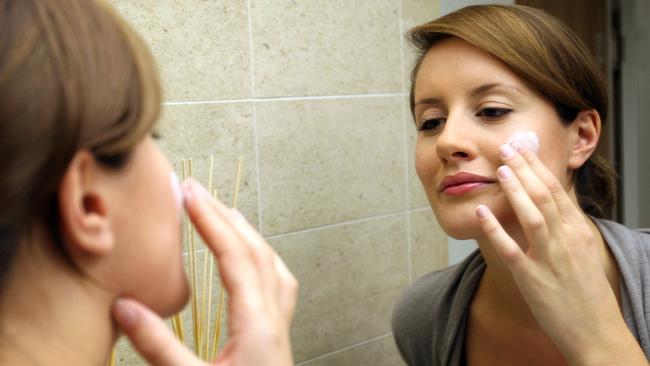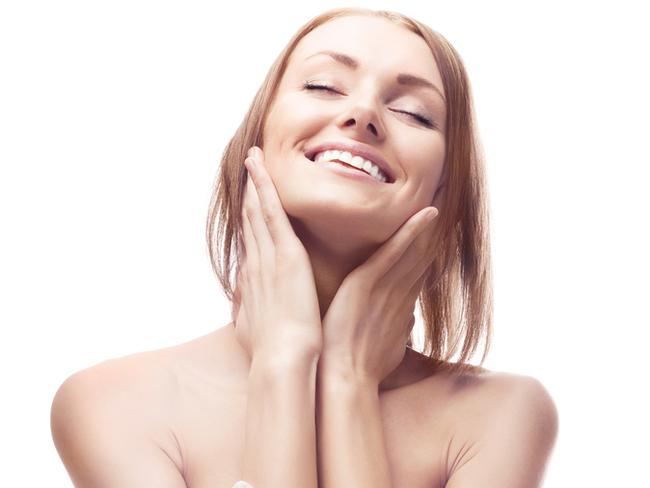Are you buying the lies your beauty products are selling?
“YOU’RE worth it,” we’re told. But so many of the expensive bottles in your bathroom aren’t worth much at all. This is the great beauty con.

THERE are beautiful women all around me, urging me to become more beautiful.
They’re plastered all over my television, my web browser and those magazines I pretend not to love at the salon, looking straight into my face and telling me how amazing their lips, skin and hair feel. And there’s no doubt about it — they’re gorgeous.
I know deep down I should probably ignore these glossy, pouty temptresses and get on with the business of being ordinary, but how can I, when they’re offering so much?
Cyndi Crawford can help me firm my neck skin! Giselle Bundchen can fortify my hair! Eva Longoria thinks I’m worth it!
These serious, seductive, successful women know what they’re talking about, don’t they? The things they promise sound tantalisingly attainable, but are they too good to be true? Are they lying to me?
Yes.
And no.
It depends on your definition of lying.
The folks at the Australian Competition and Consumer Commission don’t like lies. They certainly frown upon any advertising statements that are “likely to create a false impression”, as they put it. Basically, if an ad says a product can do certain things and it can’t, that ad is breaking the law.
Presumably, the law applies to the use of actual words found in at least one English dictionary somewhere. Putting real words together in a meaningful sentence is one thing. But it seems making up your own words by banging some clinical-sounding syllables together is another. If your words mean nothing, how can they be untrue?
Take “chrono-extraction” for example. You might find that in an ad for skincare products, but you won’t find it in any dictionary. Or “skingenecell”. Or “micro-elastin”. They mean nothing, yet we can be convinced to want them as if they were real.

I want to be a part of this fantasy. Not as a consumer, though. If all these cosmetics companies can invent their own truth and flog it in a sparkly advertising campaign, why can’t I? Here’s my plan:
STEP 1: CREATE A PRODUCT
It doesn’t have to be new or complicated. There’s no need to harvest Himalayan flowers or squeeze anything from a bee’s bum. A bit of olive oil, salt water or charcoal will do. It will include an AMAZING, secret active ingredient though, with an impressive-sounding name straight out of the beauty lab, like brightness diffusion essence, or synchronised recovery complex, or hydra tri-action aqua droplets. I wish I was making those up.
STEP 2: CONDUCT ‘RESEARCH’
This step is essential for providing evidence for a product’s phenomenal capabilities. I won’t go overboard though — I’ll provide free samples to a handful of girls in the office, promise them another freebie if they say something nice about it, and hooray, result! “90 per cent of women reported an overall improvement and said they would use this product again”.
STEP 3: INVENT A PROBLEM
All I have to do is link an adjective to a body part. Undisciplined hair. Broad pores. Limp eyelashes. Whatever, I just want to make people feel bad about themselves.
STEP 4: INVENT A SOLUTION
I’m not just selling ointment in a tube — I’m selling a solution! Deliverance from a bleak, dystopian future! The people will believe that without my magic potion, complexions will languish in dullness; eyelashes will remain pale and unplumped; and millions of bingo wings will be left flapping in the cold, cold wind of unrealised beauty dreams.
STEP 5: COUNT MY MONEY
Seriously, have you seen how much people pay for this stuff? You can buy 15 ml of “eye serum” for $81.00. Fifteen millilitres of oil and parsley juice. For a bit of perspective, that’s more than five thousand times the price for the same quantity of milk, and nobody had to touch a cow’s private parts to get it.
I figure I’d only have to be in business for a couple of years before I’m sitting on a mountain of money with a big smile on my face. And if that big smile gives me wrinkles, I’m sure there’s a beautiful woman close by, not-really-lying to me about how to get rid of them.
Shelley Stocken is a freelance writer with a special interest in scepticism and rage-typing opinions on a coffee-stained keyboard. She tweets as @shellity.
